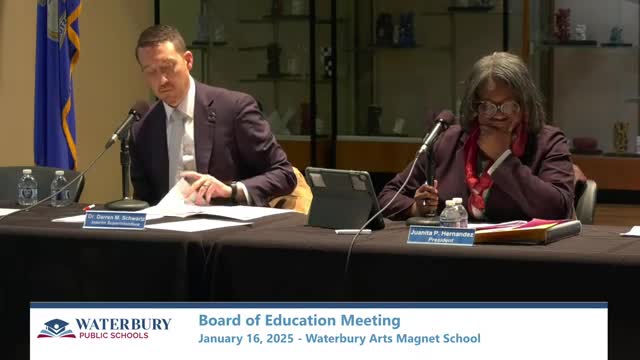Interim superintendent highlights citywide funding needs, summer-program concerns and salad-bar pilot
Get AI-powered insights, summaries, and transcripts
Subscribe
Summary
Interim Superintendent Dr. Swartz told the board Jan. 16 that a press conference with mayors of Connecticut’s five largest cities emphasized funding shortfalls; he also reported a salad-bar pilot at Gilmartin that will expand to other schools.
Interim Superintendent Dr. Swartz told the Waterbury Board of Education on Jan. 16 that he joined a press conference at the state capitol with mayors from Connecticut’s five largest cities to advocate for additional funding for high-need districts.
“At that press conference...those five cities account for 48% of all homeless students in the entire state of Connecticut,” Dr. Swartz said, adding that the five cities “service 83% of our students of high need.” He also said, “I believe close to 4 in every 10 multilingual learners in the state is in our city,” and he used the district’s turnaround-school work as an example of how additional funding can produce measurable gains.
Dr. Swartz warned that some pandemic-era funds such as ESSER are phasing out and that the district has already had to scale back programs paid for by one-time grants, including extended counseling, tutors and summer offerings. He said those reductions make future state funding more urgent if the district is to maintain expanded summer credit recovery and other enrichment programs.
On nutrition and school meals, Dr. Swartz reported the district piloted a salad bar at Gilmartin School in December and will expand the program: “Starting Tuesday, we are going to be opening it up and go big time at Kennedy, and Tri North End is actually gonna start on Thursday,” he said. He cited student survey data showing strong participation at Gilmartin — “on December 17th, we had over 90 students in the upper grades at Gilmartin take a salad that day” — and credited the School Health and Wellness Advisory Committee and partners including district staff and the local health department for the pilot.
Why it matters: Funding dynamics and the phase-out of federal pandemic-era dollars shape which programs the district can sustain. The salad-bar expansion is a near-term program change that may affect student meal choices and participation.
Dr. Swartz closed by noting two of the district’s three turnaround schools have exited that status and a third has made a year of growth and needs one more year to reach the district’s stated goal.
